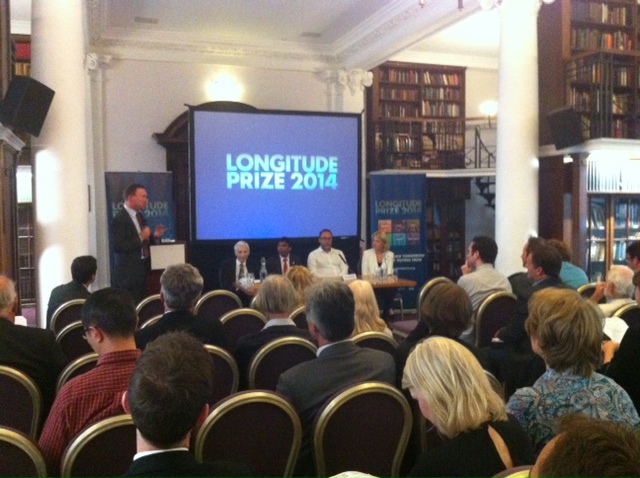By Roger Highfield, Director of External Affairs at the Science Museum and member of the Longitude Committee.
In a few days, the subject of the world’s greatest challenge prize – the £10 million Longitude Prize 2014 – will be unveiled by the BBC after an unprecedented public vote.
However, it became clear at a meeting held in the museum this week that the motivation to reincarnate the Longitude Prize on its 300th anniversary is not just a matter of money, though it is certainly newsworthy, nor is it simply the glory of being the first, or best, or most innovative.
As Jimmy Wales, Wikipedia founder put it, it is also because “we want a culture where kids aspire to be great scientists and get the societal recognition.”
And he hoped the prize, launched last year by the Prime Minister, would motivate those who lie outside the traditional spheres of well-funded grand institutions and specialised scholars and ‘tap into all the other crazy people out there.’

Wales was addressing the Longitude Lounge, organised at the museum by Nesta, the UK’s innovation foundation who are developing and running the Prize, with support from the Technology Strategy Board. The aim is to ‘push innovation on the boundaries of the possible and impossible,’ Geoff Mulgan, Nesta Chief Executive, told leading innovators who had gathered at the museum.
The new prize is open to anyone, anywhere, he said. However, in a departure from the original, it is also down to the public to decide which of six challenges to tackle around low carbon flight, food and water security, and paralysis, antibiotic resistance and dementia (you can vote here).
The prize has been promoted on the BBC. Amazon is emailing its UK customers, estimated to be many millions, to encourage them to take part. And around 300 schools have registered to take part in the Longitude Prize schools programme.
How will the public vote? Wales said that the six challenges all have ‘different levels of public appeal and prizeability’ but, on balance, he backed the paralysis challenge, not least because it could benefit from a wide range of existing computer and machine assisted technologies.
Also speaking was Naveen Jain, entrepreneur and founder of Moon Express, who said he felt the public would back the water challenge ‘but it if is audacious, it has to be dementia.’
The third speaker, designer, artist and writer Daisy Ginsberg, picked the antibiotics and food challenges, though she felt that food was perhaps the more exciting. ‘We should put our money where our mouth is.’
Lord Rees, who chairs the Longitude Committee, said that once the public had voted, an expert group would formulate the rules for the prize (‘that is going to be the difficult part’) but he added that he hoped the remaining areas would find commercial sponsors.
He said that it was inspirational to have the meeting in the Science Museum, ‘the greatest shrine to science, technology and innovation.’
Lord Rees added that he hoped that he would not be as curmudgeonly as his Longitude predecessor, Reverend Dr Nevil Maskelyne who was Astronomer Royal from 1765 to 1811 and sat on the first Board of Longitude.
Click here to vote for the Longitude Prize 2014. Voting closes on 25 June 2014. For more on the history of the Longitude Prize click here.